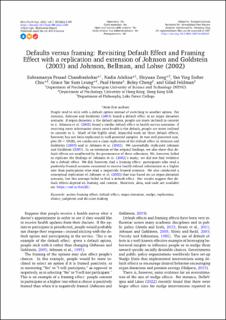| dc.contributor.author | Chandrashekar, Subramanya Prasad | |
| dc.contributor.author | Adelina, Nadia | |
| dc.contributor.author | Zeng, Shiyuan | |
| dc.contributor.author | Chiu, Yan Ying Esther | |
| dc.contributor.author | Leung, Grace Yat Sum | |
| dc.contributor.author | Henne, Paul | |
| dc.contributor.author | Cheng, Boley | |
| dc.contributor.author | Feldman, Gilad | |
| dc.date.accessioned | 2023-07-27T06:57:43Z | |
| dc.date.available | 2023-07-27T06:57:43Z | |
| dc.date.created | 2023-07-11T08:34:31Z | |
| dc.date.issued | 2023 | |
| dc.identifier.citation | Meta-Psychology. 2023, 7 . | en_US |
| dc.identifier.uri | https://hdl.handle.net/11250/3081541 | |
| dc.description.abstract | People tend to stick with a default option instead of switching to another option. For instance, Johnson and Goldstein (2003) found a default effect in an organ donation scenario: if organ donation is the default option, people are more inclined to consent to it. Johnson et al. (2002) found a similar default effect in health-survey scenarios: if receiving more information about your health is the default, people are more inclined to consent to it. Much of the highly cited, impactful work on these default effects, however, has not been replicated in well-powered samples. In two well-powered samples (N = 1920), we conducted a close replication of the default effect in Johnson and Goldstein (2003) and in Johnson, Bellman, and Lohse (2002). We successfully replicated Johnson and Goldstein (2003). In an extension of the original findings, we also show that default effects are unaffected by the permanence of these selections. We, however, failed to replicate the findings of Johnson, Bellman, and Lohse’s (2002) study; we did not find evidence for a default effect. We did, however, find a framing effect: participants who read a positively-framed scenario consented to receive health-related information at a higher rate than participants who read a negatively framed scenario. We also conducted a conceptual replication of Johnson et al. (2002) that was based on an organ-donation scenario, but this attempt failed to find a default effect. Our results suggest that default effects depend on framing and context. Materials, data, and code are available on: https://osf.io/8wd2b/. | en_US |
| dc.language.iso | eng | en_US |
| dc.publisher | Linnaeus University | en_US |
| dc.rights | Navngivelse 4.0 Internasjonal | * |
| dc.rights.uri | http://creativecommons.org/licenses/by/4.0/deed.no | * |
| dc.title | Defaults versus framing: Revisiting Default Effect and Framing Effect with a replication and extension of Johnson and Goldstein (2003) and Johnson, Bellman, and Lohse (2002) | en_US |
| dc.title.alternative | Defaults versus framing: Revisiting Default Effect and Framing Effect with a replication and extension of Johnson and Goldstein (2003) and Johnson, Bellman, and Lohse (2002) | en_US |
| dc.type | Peer reviewed | en_US |
| dc.type | Journal article | en_US |
| dc.description.version | publishedVersion | en_US |
| dc.source.pagenumber | 18 | en_US |
| dc.source.volume | 7 | en_US |
| dc.source.journal | Meta-Psychology | en_US |
| dc.identifier.doi | https://doi.org/10.15626/MP.2022.3108 | |
| dc.identifier.cristin | 2161799 | |
| cristin.ispublished | true | |
| cristin.fulltext | original | |
| cristin.qualitycode | 1 | |

